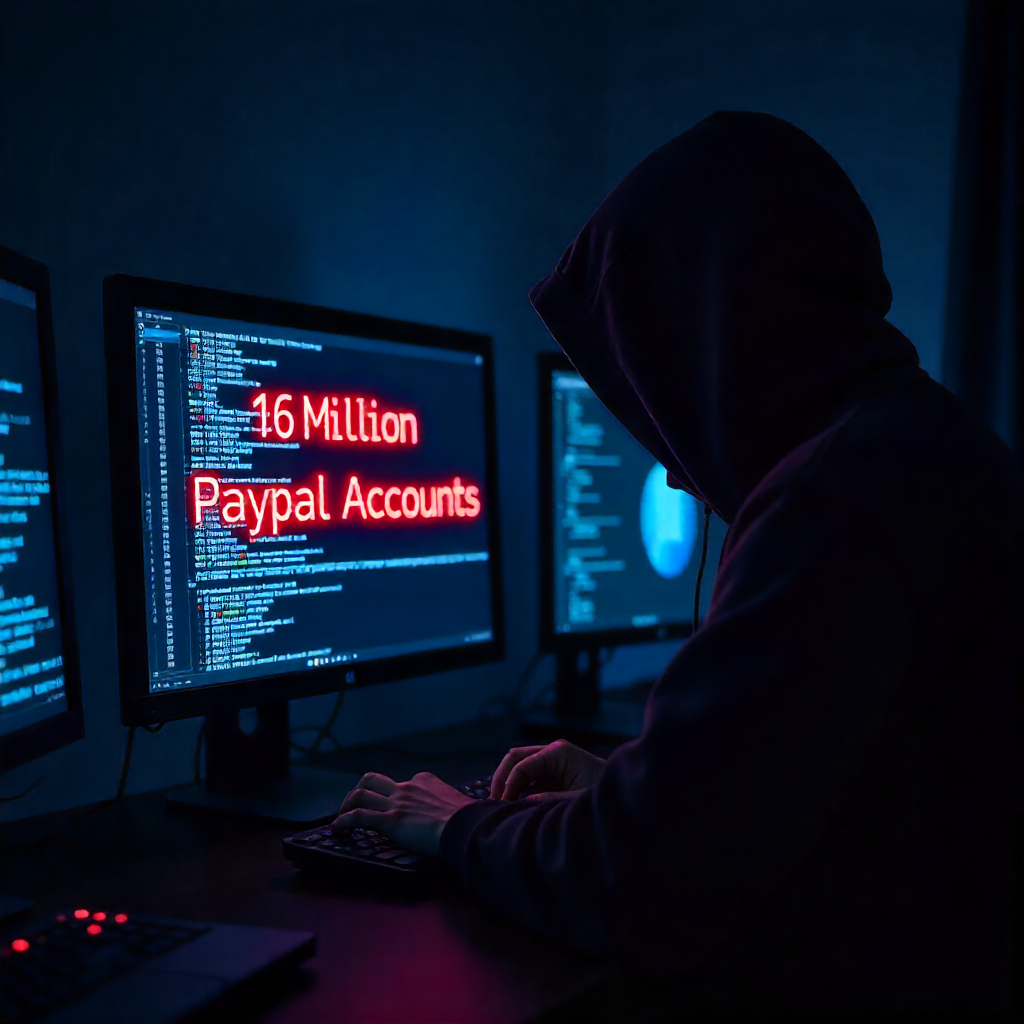Your financial login details are being sold cheaper than a cup of coffee. Here’s what that really means for your money.
Think your PayPal account is secure because you use a strong password? Bad news: hackers just posted 15.8 million PayPal login details on underground forums, and they’re selling the entire database for less than the price of a latte.
Your payment details are now bargain-bin merchandise
Picture opening your email to find unauthorized PayPal transactions. Someone in another country just used your account to send money to themselves. Your bank account shows mysterious withdrawals. Your credit cards have charges you never made.
This isn’t a hypothetical scenario anymore.

Cybercriminals are advertising a massive dataset containing login emails, passwords, and direct links to PayPal services from 15.8 million accounts worldwide. The scariest part? They’re selling this treasure trove of financial access for just $750 total.
That means your complete PayPal login credentials are worth less than fifty cents to criminals.
While PayPal denies any new breach occurred, the damage is already done. Whether this data came from their systems or from malware on users’ devices doesn’t matter to the hackers now trying to access your account.
What’s actually happening with your financial data
What this PayPal situation really is
This isn’t just another data leak. Criminals are selling a complete toolkit for financial fraud.
The leaked database doesn’t just contain usernames and passwords. It includes direct URLs to PayPal login pages, making it incredibly easy for automated systems to test stolen credentials at massive scale.
Think of it like giving burglars not just your house key, but also your exact address and a map showing which windows are unlocked.
How your financial information gets stolen
Security researchers believe this data likely came from “infostealer” malware, not a direct hack of PayPal’s systems.
Here’s how it works:
Silent infection: You click on what seems like a normal email attachment or download. Hidden malware installs on your device without any obvious signs.
Data harvesting: The malware quietly scans your browser for saved passwords, credit card details, and login information. It doesn’t slow down your computer or show obvious symptoms.
Bulk collection: Your stolen information gets bundled with millions of other victims’ data and sold on criminal marketplaces.
The terrifying part? Modern infostealer malware doesn’t just target Windows computers. It’s designed to work on Mac and Android devices too, meaning no one is safe just because of their device choice.
Why this matters more than typical data breaches
Traditional data breaches expose information that’s usually encrypted or partially protected. This leak is different because it contains:
Plaintext passwords: Your actual password, not an encrypted version that needs to be cracked.
Active login URLs: Direct links that point automated attack tools exactly where to go.
Global reach: The dataset includes accounts from users worldwide, meaning this isn’t limited to one region or country.
Reuse vulnerability: Many of the passwords in the leak are reused across multiple accounts, meaning one compromised password could unlock several of your services.
The low selling price tells us something disturbing: this type of financial data is so common on criminal markets that it’s practically worthless to sell, but incredibly valuable to use for fraud.
How to protect your money from credential theft
Your financial login details are being sold cheaper than a cup of coffee. Here’s what that really means for your money.
Think your PayPal account is secure because you use a strong password? Bad news: hackers just posted 15.8 million PayPal login details on underground forums, and they’re selling the entire database for less than the price of a latte.
Your payment details are now bargain-bin merchandise
Picture opening your email to find unauthorized PayPal transactions. Someone in another country just used your account to send money to themselves. Your bank account shows mysterious withdrawals. Your credit cards have charges you never made.
This isn’t a hypothetical scenario anymore.
Cybercriminals are advertising a massive dataset containing login emails, passwords, and direct links to PayPal services from 15.8 million accounts worldwide. The scariest part? They’re selling this treasure trove of financial access for just $750 total.
That means your complete PayPal login credentials are worth less than fifty cents to criminals.
While PayPal denies any new breach occurred, the damage is already done. Whether this data came from their systems or from malware on users’ devices doesn’t matter to the hackers now trying to access your account.
What’s actually happening with your financial data
What this PayPal situation really is
This isn’t just another data leak. Criminals are selling a complete toolkit for financial fraud.
The leaked database doesn’t just contain usernames and passwords. It includes direct URLs to PayPal login pages, making it incredibly easy for automated systems to test stolen credentials at massive scale.
Think of it like giving burglars not just your house key, but also your exact address and a map showing which windows are unlocked.
How your financial information gets stolen
Security researchers believe this data likely came from “infostealer” malware, not a direct hack of PayPal’s systems.
Here’s how it works:
Silent infection: You click on what seems like a normal email attachment or download. Hidden malware installs on your device without any obvious signs.
Data harvesting: The malware quietly scans your browser for saved passwords, credit card details, and login information. It doesn’t slow down your computer or show obvious symptoms.
Bulk collection: Your stolen information gets bundled with millions of other victims’ data and sold on criminal marketplaces.
The terrifying part? Modern infostealer malware doesn’t just target Windows computers. It’s designed to work on Mac and Android devices too, meaning no one is safe just because of their device choice.
Why this matters more than typical data breaches
Traditional data breaches expose information that’s usually encrypted or partially protected. This leak is different because it contains:
Plaintext passwords: Your actual password, not an encrypted version that needs to be cracked.
Active login URLs: Direct links that point automated attack tools exactly where to go.
Global reach: The dataset includes accounts from users worldwide, meaning this isn’t limited to one region or country.
Reuse vulnerability: Many of the passwords in the leak are reused across multiple accounts, meaning one compromised password could unlock several of your services.
The low selling price tells us something disturbing: this type of financial data is so common on criminal markets that it’s practically worthless to sell, but incredibly valuable to use for fraud.
How to protect your money from credential theft
Immediate steps you must take today
Change your PayPal password right now. Don’t wait to see if your account was affected. If you’ve used the same password anywhere else, change those too.
Enable two-factor authentication immediately. Even if criminals have your password, they can’t access your account without the second verification step from your phone.
Check your account activity. Look for any transactions, login attempts, or changes you didn’t make. PayPal’s notification system can alert you to suspicious activity, but you need to enable it.
Understanding the broader threat landscape
This PayPal incident isn’t isolated. It’s part of a massive wave of credential theft affecting millions of people worldwide.
Infostealer malware is everywhere. Security researchers report that tools like RedLine, Raccoon, and Vidar are widely available on criminal forums, requiring no technical skills to deploy.
Your device is the weak point. Unlike server breaches that companies can prevent, infostealer attacks target your personal computer, phone, or tablet directly.
Password reuse multiplies the damage. When criminals get one password, they test it across multiple services. Banking, social media, email, shopping accounts can all be compromised from a single stolen credential.
Recognizing the signs of infostealer infection
Most people don’t realize their device is infected because modern malware is designed to be invisible. Watch for these subtle warning signs:
-
Slightly slower browsing or unexpected browser behavior
-
Emails about password reset requests you didn’t make
-
Friends mentioning they received strange messages from your accounts
-
Unexpected notifications about new device logins
The problem is that by the time you notice these signs, your information may have already been stolen and sold.
The QUX Pay® approach to financial privacy
Why QUX Pay® takes a different approach to financial transactions
QUX Pay® operates on privacy-first principles that protect your financial information from the start.
Your transaction data stays private. QUX Pay® doesn’t store detailed payment histories or build spending profiles that can be stolen in data breaches. Your financial activity remains between you and your bank.
Direct connection control. With QUX Pay®, you choose how you connect to financial services. Use WiFi when convenient, or switch to ethernet when you want maximum security for important transactions. Wired connections can’t be intercepted like wireless signals.
No data aggregation targets. QUX Pay® doesn’t collect and store large databases of user financial information that become attractive targets for criminals seeking to steal millions of accounts at once.
Technical protection that actually protects your money
Military-grade encryption. QUX Pay® secures your financial communications with the same encryption standards trusted by defense organizations worldwide. Your payment data stays protected even if network connections are compromised.
Transparent security processes. Instead of hiding security behind complex corporate policies, QUX Pay® explains exactly how your financial information is protected. You understand your security instead of hoping some distant server got it right.
No behavioral profiling. QUX Pay® doesn’t analyze your spending patterns or build profiles of your financial behavior that can be stolen and used for fraud.
Building financial freedom instead of financial surveillance
The breach shows what happens when you depend on platforms that collect and store massive amounts of financial data. These centralized systems create enormous targets for criminals.
QUX Pay® operates differently. We succeed when you have genuine financial privacy, not when we collect more data about your spending habits.
You control your financial footprint. QUX Pay® gives you the tools to make secure transactions without surrendering your spending data to systems that can be breached.
No transaction tracking. We don’t build databases of where you spend, what you buy, or how much you spend that can be stolen and used against you.
Community-focused security. Every QUX Pay® user benefits from privacy-first design. We’re building financial technology that serves users instead of converting financial data into profit centers.
Your financial privacy deserves better protection
The PayPal credential dump represents a fundamental problem with how financial services handle your data. When platforms store millions of login credentials in databases that can be stolen and sold for $2, the system is broken.
Whether this data came from PayPal’s systems or from malware on user devices doesn’t change the result: your financial access is now available on criminal markets for pocket change.
PayPal already paid $2 million in fines for a previous security incident, showing this isn’t their first problem with protecting user data.
QUX Pay® takes the opposite approach. We build financial privacy into the foundation rather than adding security as an afterthought. Your transactions get genuine protection instead of being stored in databases that become targets for criminals.
Discover true financial freedom with QUX Pay® – where your payment data isn’t collected, stored, or sold on dark web forums.
Because in a world where 16 million financial accounts can be sold for less than a coffee, choosing platforms that protect your money by design isn’t just smart. It’s essential.
This analysis discusses publicly reported organizational experiences, government investigations, and advocacy findings and is intended for educational and informational purposes only. QUX® makes no legal claims or guarantees regarding content moderation, First Amendment protections, or platform policies. All product names, trademarks, and company references are property of their respective owners. Content moderation policies, legal frameworks, and platform practices should be independently verified. Past platform actions, regulatory findings, or organizational experiences do not predict future outcomes. Users should consult legal professionals for specific advice regarding content rights and platform policies.
